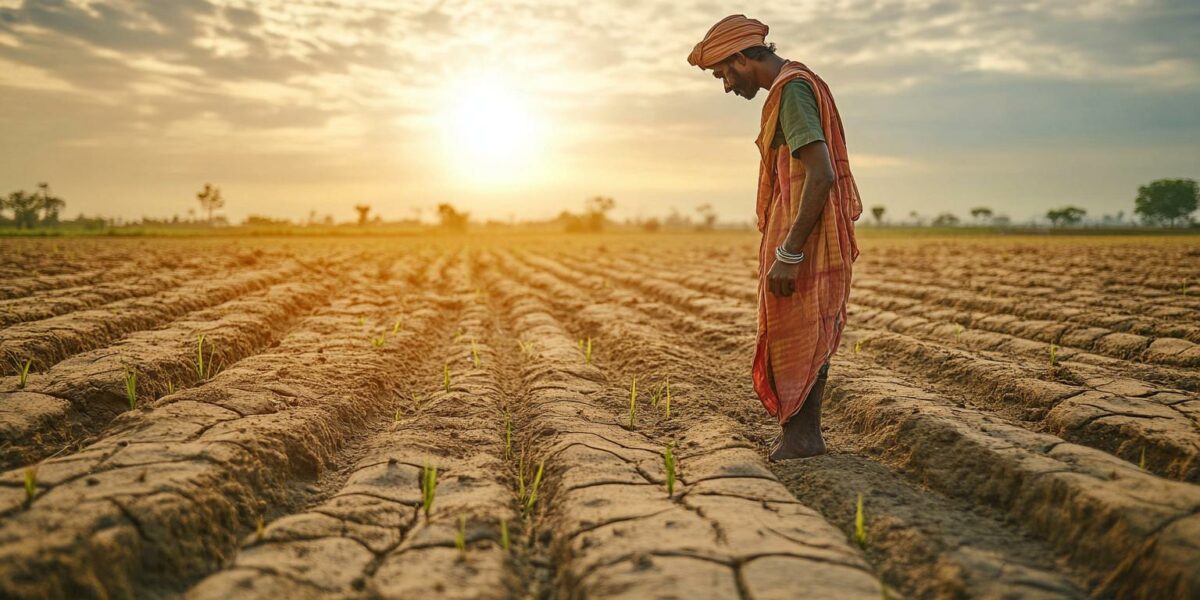The Unpredictable Climate and Its Impact on Rice Farming
In Rayanpet, a village in India’s arid south, the unpredictable climate has significantly impacted rice farming. Erratic rainfall and increasing temperatures are making it difficult for farmers like P. Ravinder Reddy to predict the right time to sow seeds. Excessive rain or complete drought often leads to seeds failing to sprout.
Reddy, a former soldier turned farmer, explains, “We used to know when it would rain and for how long, and we sowed our seeds accordingly. Now it’s so unpredictable.” This change in climate patterns has forced many farmers to adapt to new agricultural practices.
Fortunately, Indian agricultural research organizations have been working on engineering rice seeds that can withstand these climate extremes. Reddy has been experimenting with these new varieties for the past five years, noting that they offer better yields with less water and are more disease-resistant.
“I have planted them across a quarter of my 25-acre field because there’s still demand for older varieties, but I think in a few years, we will use only these tougher seeds,” he added. This shift is crucial for maintaining productivity in the face of climate change.
Global Efforts and the Importance of Resilient Seeds
India, one of the world’s largest producers and consumers of wheat and rice, is at the forefront of developing climate-resilient seeds. Research organizations here are working to create seeds that can increase yields, withstand drought, and resist plant diseases.
A United Nations report highlighted that more than 700 million people went hungry last year, emphasizing the urgent need for resilient seeds. Global efforts, including U.S. government programs and privately funded projects, are also focused on developing climate-resilient crops in Africa, Central America, and Asia.
As one of the countries most vulnerable to climate impacts, India’s development of these seeds is critical for ensuring food security. These seeds help produce enough food for the population and for export, even as climate change intensifies.
India’s nearly 120 million farmers, most with less than 5 acres of land, face threats from erratic rainfall, rising temperatures, and increased pest infestations. Innovative farming techniques and resilient seeds are essential for their survival.
Innovative Farming Techniques and Government Initiatives
Some farmers are turning to natural farming methods to combat climate change. These techniques include using natural fertilizers and planting crops alongside trees and other plants to protect against wind, erosion, and extreme weather.
However, these methods can result in reduced yields. To counter this, India’s federal government is promoting the use of climate-resilient seeds that do not compromise on productivity. Initiatives are being taken to ensure that these seeds are accessible to farmers.
Increasing salinity in groundwater, heavy rainfall, prolonged droughts, and rising nighttime temperatures significantly impact rice seeds. Experts emphasize the need for seeds that can handle these challenges effectively.
“We really need these seeds to deal with these multiple issues created by global warming,” said Ashok Kumar Singh, a former director at the Indian Agriculture Research Institute. Singh’s organization has released over 2,000 climate-resilient seed varieties in the last decade with federal funding.
Ensuring Accessibility and Training for Farmers
Prime Minister Narendra Modi recently released 109 climate-resilient seeds across various crops, including cereals, pulses, and oilseeds. The federal government plans to ensure that at least 25% of paddy land will be sown with these seeds in the upcoming winter crop season.
Janila Pasupuleti from the International Crops Research Institute for the Semi-Arid Tropics noted, “We are breeding for multiple stressors, including heat and disease resistance.” This approach stabilizes yields and enhances the nutritional quality of crops.
Despite the progress in creating climate-resilient seeds, distributing these seeds to farmers is crucial. Key steps include:
- Ensuring farmers are aware of these seeds
- Making them affordable
- Providing adequate training for proper usage
Aditi Mukherji, director for climate change adaptation at the Consultative Group on International Agricultural Research, emphasizes that coordination at the state and federal levels is essential for success.
Additionally, there is a need for more funding for research and development, equivalent to at least 1% of the agricultural GDP, to continue the creation of these vital seeds. This investment is crucial for future-proofing India’s agriculture against climate change.



SebastianSiren
Do these new seeds require different farming techniques?
Carson
Great initiative! Hope it reaches all parts of India soon. 😊
brysonquester
Why does it always seem like the farmers are the ones suffering the most?
danielempyreal
Are these super seeds available for crops other than rice and wheat?
Jeremiah
climate change is real, and this is a testament to it. Kudos to the researchers!
SophiaShadowdancer
It’s alarming how unpredictable the weather has become. What’s next?
owen_nebulae4
Why isn’t there more government support for traditional farming methods?
Misty
Wow, 2,000 seed varieties in a decade! That’s impressive!
lily
Great work by the scientists! Will these seeds be affordable for all farmers?
carsonprism
This is amazing! How can we help support these initiatives? 🌱